Why BETTER CALL SAUL is a Screwball Comedy Influenced Love Story
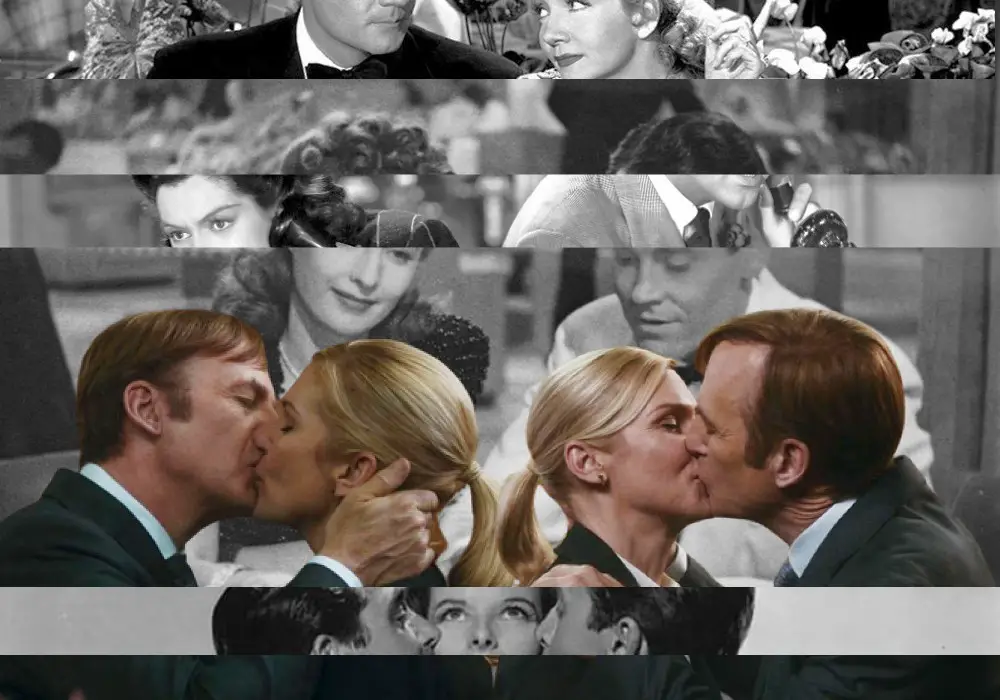
Amanda Mazzillo is a writer with an MFA in Dramatic…
Spoilers ahead if you haven’t finished Better Call Saul.
Better Call Saul at its core is a love story–the most important aspect of the series is the complex relationship between Jimmy McGill (Bob Odenkirk) and Kim Wexler (Rhea Seehorn). No matter what, there is always an underlying love between the pair even when their romance seems doomed.
If we look even closer at their dynamic, the relationship and how Vince Gilligan and Peter Gould explore these characters has a Classic Hollywood spirit, primarily one in conversation with the traditional Screwball Comedy–a subgenre of American comedy during the 1930s and 1940s, in response to the Motion Picture Production Code of 1934.
There is humor within Better Call Saul which highlights the intensity and nuance of Jimmy and Kim’s relationship. Every moment between the pair has a quality of calm, never-ending love underscored with realism and danger.
Screwball comedies often deal with scenarios that seem dangerous but are told in a completely comedic and deeply romantic manner. Better Call Saul explores these more serious elements of the screwball comedy with drama and realistic depth, but maintaining–and beautifully representing the romance.
Finding glimpses into this classic genre reinforces the unique dynamic between Jimmy and Kim. Tropes of the Screwball Comedy include the comedy of remarriage–divorced couples reuniting and remarrying, somewhat zany stories of con men (and women), unlikely romances–often tied up with characters from different worlds who are more alike than they think–, and women in charge–of their own destinies and the trajectory of their relationships.
The Palm Beach Story and Better Call Saul
Throughout Better Call Saul–even before they fully admit it to themselves–Jimmy and Kim are inseparable and their budding romance mirrors the classic Hollywood couples they watch together, curled up on the couch with takeout boxes. These moments of rest among their hectic busy lives allow the audience to understand Jimmy and Kim more fully, and see within their relationship.
When they marry–under the guise that it is only to protect Kim in a case where she has to testify against Jimmy–we can feel their happiness explode off the screen, while still understanding the emotional circumstances that brought them to this decision. And typical of the screwball comedy, Kim is the one to first bring up marriage. The heroine in the screwball comedy is always the catalyst for every aspect of their romance. She is in charge of the story, directly impacting the action we see.
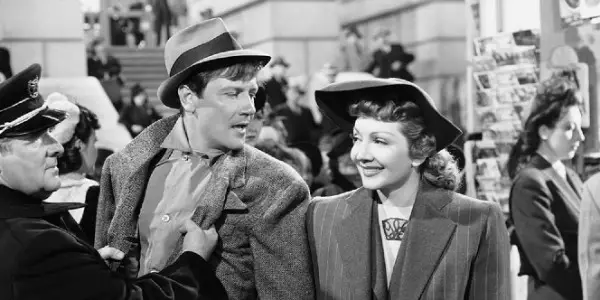
This brings us to one of the prime examples of Screwball comedy which is reflected in Jimmy and Kim’s relationship: The Palm Beach Story.
In The Palm Beach Story, Gerry (Claudette Colbert) deeply loves her husband Tom (Joel McCrea) even though their marriage started in strange, hectic circumstances. The opening sequence of the film shows two women played by Claudette Colbert–one getting married and one tied up in a closet. Later on, we learn Gerry and Tom met because they were both twins.
This implies that Gerry tied her sister up in the closet, so she could marry her fiancé. But it also suggests that Tom also stole the wedding from his twin. In the opening we see Tom change from one suit to another. These two end up together and fall deep in love, even though they were both trying to con their way into a marriage with their sibling’s fiancé.
Flashforward to Tom and Gerry married and seemingly happy, but maybe not. Gerry explains to Tom that they cannot be married. She tells him she isn’t good for him and says, “We’re just habits, bad habits.” Gerry wants to divorce Tom because she feels being married hinders their growth as people, much like how Kim tells Jimmy they need to divorce and says, “I have had the time of my life with you. But we are bad for everyone around us.”
In The Palm Beach Story, Tom fights Gerry’s decision, expressing how the pair loves each other and how that is all that matters. Similarly, Jimmy pleads with Kim. He loves her and she loves him. Both Tom and Jimmy are confused and distraught over the decision of their wives. This comes through beautifully with Jimmy’s declaration: “We make each other happy. How can that be bad?” This question permeates through Jimmy and Kim’s relationship and highlights how their dynamic recalls the complex romance between Tom and Gerry in The Palm Beach Story.
Gerry’s response to Tom’s pleading allows us to see how much she still loves him, even after making this momentous decision. She expresses that if she does not do this now, she would never have the courage to do it.
In Better Call Saul, Kim’s decision to leave Jimmy comes after trying to make sure their relationship wouldn’t end by keeping information from Jimmy–scared that he would stop their scam in order to protect Kim and their relationship would come to an end.
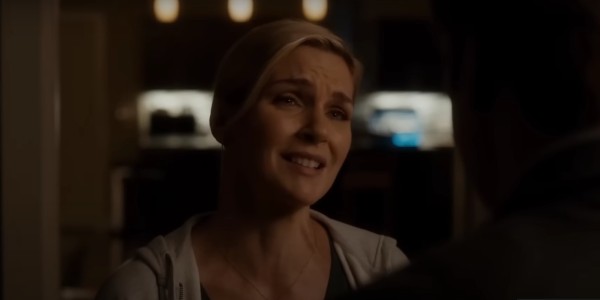
Tom and Gerry part ways, with Gerry fleeing to Palm Beach, Florida–choosing it over Vegas as a destination to get a quick divorce, but her true plans unravel as she heads to Florida. In Better Call Saul, we also see Kim post-divorce leaving–also to Florida–to start a new life, distanced from anything that brings her joy. This new life is a punishment for Kim, since indulging in fun and games hurt those around her. She starts a new life devoid of anything that could bring her joy or remind her of Jimmy.
Another aspect of the screwball romance between Tom and Gerry that recalls Jimmy and Kim’s own romance comes after Tom follows Gerry to Florida. Like Jimmy and Kim, Tom and Gerry work well together and use this to scam rich people.
Gerry has found a dull, boring, yet ridiculously rich man, John D. Hackensaker (Rudy Valee), who wants a traditional housewife.
In The Palm Beach Story, Hackensaker talks about his old-fashioned ways and desire for a wife who can cook, clean, and sew. But Gerry is a modern woman who doesn’t have any of these traits. But she pretends, in order to get John to donate money for her brother, Captain McGlue’s, business.
But Gerry’s so-called brother is actually her soon-to-be ex-husband. Throughout their time in Florida, we see Tom and Gerry falling even deeper in love as they pretend to be brother and sister in order to scam John out of his money. There’s a newfound glow between the pair as they rekindle their romance while John tries to serenade Gerry from outside her window.
Con artists play a big part in screwball comedy–as well as differences between social classes, which is reflected in how Jimmy and Kim scam people of higher socioeconomic classes. When we see Jimmy and Kim conning rich assholes as brother-sister duo Viktor and Giselle St. Claire, their happiness is infectious. The way Jimmy and Kim’s feelings for each other explode when they scam together mirrors how Tom and Gerry grow closer again when pretending to be people they are not.
At times in The Palm Beach Story, Tom wants to stop their scam and go back to how their life was before, but Gerry wants to keep going. There is a push and pull between Tom and Gerry as well as Jimmy and Kim. Both love the scams they pull together, but there are moments where each person wants to stop.
In the six season of Better Call Saul, Jimmy feels their scam against Howard should come to an end when things go wrong, but Kim pushes to keep going. This idea of challenging morality is common in screwball comedy. We see women and men who are fully developed personalities with their own struggles–often commenting on how they wish to feel human, to feel something.
Another prominent trope in screwball is the comedy of remarriage. Stories about couples that end up divorced even though they still love each other are used throughout the genre. The Palm Beach Story is an interesting case where the pair never seem to hate each other, but Gerry tries to make herself hate Tom–much like how Kim tries to make herself forget about Jimmy. And how Jimmy tries to make him into someone completely unworthy of Kim, so the end of their marriage can make more sense to him.
After Kim leaves, Jimmy falls completely into his Saul Goodman persona. Seeing him act this way to Kim when they sign the divorce papers is one of the most depressing moments in the series. You can see Jimmy peeking through this mask he created, hoping Kim can move on if there’s no semblance of the man she once loved left in him.
Jimmy and Kim’s Philadelphia Story
Another essential screwball comedy is The Philadelphia Story (1940)–directed by George Cukor and written by Donald Ogden Stewart. This film centers on Tracy Samantha Lord (Katharine Hepburn), following her divorce from C.K. Dexter Haven (Cary Grant).
Tracy is getting remarried and her wedding is so big, reporters Macaulay ‘Mike’ Connor (James Stewart) and Elizabeth ‘Liz’ Imbrie (Ruth Hussey)are covering the event. Dexter is using his established relationship with Tracy and her family to sneak Mike and Liz into the event–under the guise they are friends of Tracy’s brother Junius. But Dexter doesn’t do a very good job of keeping their identity a secret, leading to Tracy and her family exaggerating their lifestyle in order to confuse the reporters.
When Dexter is introduced to Mike and Liz, Mike is under the impression that Dexter is accepting the unorthodox job to get revenge on his ex-wife, but without any verbal response, we can see that this isn’t Dexter’s true reasoning.
This is reflected in Better Call Saul when we see Jimmy use false information against Kim to make sure she shows up at his trial. From the outside, others might see this as Jimmy wanting revenge on Kim for divorcing him, but the real reason for his action is his desire for Kim to see how much he has changed–to see him do what she told him to do…turn himself in for his crimes.
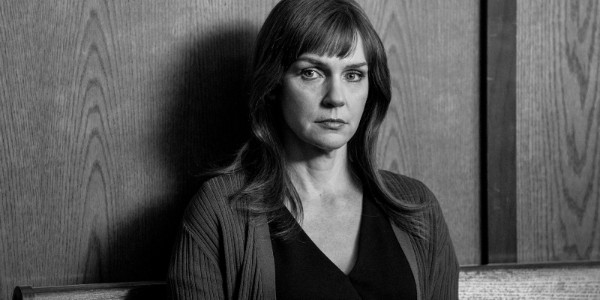
Beneath the surface of shenanigans, we experience the character’s going through life-changing experiences that highlight their internal struggles and how this impacts the ever-changing relationships they undergo.
Tracy and Dexter’s relationship mirrors Jimmy and Kim in a multitude of ways. One of them is the more surface idea that both couples experience a reunion after an emotional divorce.
In The Philadelphia Story, Tracy wants to rebuild her life after her failed marriage with Dexter and she tries to find someone his complete opposite. Her fiancé George (John Howard) actively wants the press to cover their wedding, which directly contrasts Dexter who destroyed the cameras of multiple reporters. When talking to Liz and Mike about this experience, Dexter says, “I had the strange idea our honeymoon was our own business.”
Dexter and Tracy have a lively, banter-filled relationship, while her relationship with George hinges on a few small moments, where no passion seems to exist between the pair. George is a husk of the man to which Tracy was once married.
Better Call Saul reflects this screwball trope in Kim’s choice of partner when she lands in Florida, the exceedingly average Glenn who talks to Kim about Miracle Whip and reality television. Instead of sitting together on the couch watching movies like His Girl Friday and Ice Station Zebra–like she did with Jimmy–Kim works on a puzzle, distant from The Amazing Race. Distant from Glenn.
The screwball trope of socioeconomic class differences is especially prominent in The Philadelphia Story, especially in how reporters Liz and Mike interact with Tracy’s wealthy family. When Liz and Mike explore the Tracy home alone, their dislike at the absurd displays of wealth is on display. Liz says, “Wouldn’t you know, you’d have to be as rich as the Lords to live in a dump like this?”
This satire of the absurd taste that comes with absurd levels of wealth takes focus in Better Call Saul when we see glimpses into Jimmy’s post-divorce life fully embracing his Saul Goodman identity. His new home away from the small apartment he shared with Kim highlights their differences and connects back to an earlier scene when Jimmy and Kim go to an open house together.
Jimmy is in awe of the huge mansion and the possibilities, while Kim shares some internal excitement, but you can tell she is out of her element and prefers the cozy home they already share together. For Kim, they don’t need a new big house to be happy. Which makes it hit us even harder that when Jimmy finally gets this big house of his dreams, happiness is a distant memory for him.
One of the aspects of The Philadelphia Story which showcases the film’s screwball insanity involves Tracy and her family pretending their home life is weirder and worse than it is (but within this absurdity, she discovers her life might not be as charmed as she believes.)
In Better Call Saul, we see Jimmy wanting to leave the law film Davis & Main but he does not want to lose his bonus–if he resigned, he would need to pay back the bonus–so he decides the best decision is to do everything he can to get himself fired from not flushing the toilet to playing bagpipes in the office. Both Jimmy and Tracy Lords show a sense of glee when they pretend to be worse versions of themselves–hinting at their individual insecurities.
Like Kim Wexler, Tracy hides her emotions behind a wall. When talking with Mike, Tracy admits her own insecurity when commenting on how Mike’s outwardly tough demeanor contrasts the poetry he writes. Tracy says, “I believe you put the toughness on to save your skin. I know a little about that.”
Tracy instantly wants to help Mike by giving him a house, but she creates ridiculously high standards for herself, but wants to help as many people as she can. In Better Call Saul, Kim’s standards for herself are extremely high and she adds extra pressure to every decision she makes–thinking anything below perfection is unacceptable.
Tracy does not allow herself to fail and C.K. Dexter Haven expresses that she needs to allow herself to slip up and make mistakes to understand human frailty. He tells Tracy, “you’ll never be a first-class human being or a first-class woman, until you’ve learned to have some regard for human frailty. It’s a pity your own foot can’t slip a little sometime” which is something she desperately needed to hear.
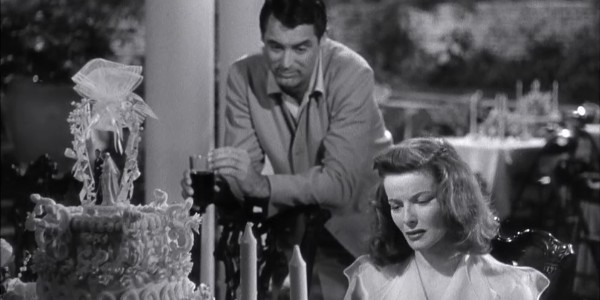
In Better Call Saul, Kim Wexler does not allow herself to fail–and because she is trying so hard to never make a single mistake, hiding her past behind crumbling walls–she also has trouble accepting when others slip up and fail. Kim also does not accept help from anyone else. One of Kim’s most memorable lines is when Jimmy offers to help her and she responds with “I save me.” This sentiment comes back to haunt Kim when she will not allow herself to ask Jimmy for help or even acknowledge that she needs help. When Kim learns that Lalo is back, she keeps this from Jimmy, deciding that she will figure it out alone.
Both Tracy and Kim do not want to rely on anyone other than themselves and this ties into their childhoods and family relationships.
Tracy does not want to need to rely on a man because her father left her mother. Kim doesn’t want to rely on anyone else because her mother was an alcoholic who shoved her from place to place. Kim had to always be the one to save herself.
Kim will not accept that Jimmy could help her, even in this life-threatening scenario. Tracy does not fully grasp the importance of Dexter’s comments until she finds herself speaking to Mike. She says, “You can’t be a first-rate writer or a first-rate human being until you’ve learned to have some small regard for human frailty.” She stops before finishing the last word, allowing Dexter’s judgment to wash over her and she fully absorbs his words.
In The Philadelphia Story, Tracy expresses how she doesn’t feel like a human being and views herself in a negative light for expressing any emotions that go against what she feels is right due to her father’s unfair expectations. With Dexter, Tracy says, “I’m such an unholy mess of a girl,” which he quickly shoots down.
When Tracy is accused of cheating on George with Mike, he instantly thinks the worst of her. Tracy responds with, “Somehow I’d have hoped that you’d think better of me than I did.” This proves how poorly suited they are for each other.
Kim’s opinions about herself mirror Tracy’s. Both characters view themselves as the reason for every failure or misfortune in their lives. Kim blames herself for Jimmy becoming Saul since she pushed their scam against Howard Hamlin.
Tracy and Dexter are shown as fully understanding each other, even though they once thought they were bad for each other–much like Kim deciding she and Jimmy need to divorce because they are bad together, but noticing these flaws within each other is why Dexter and Tracy, as well as Jimmy and Kim, fit together perfectly.
Better Call Saul & His Girl Friday
In the fifth season Better Call Saul episode Bad Choice Road–after Jimmy finally made it home, he and Kim spend time together doing something they love that has been represented throughout their relationship: watching movies.
This scene represents Jimmy and Kim’s romance–and where each character exists in their life at that moment, both relieved to be home and back together, but are shown in completely different ways.
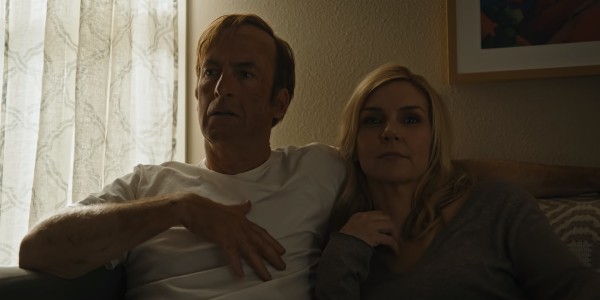
We can hear the dialogue of His Girl Friday as Jimmy and Kim sit close together on their couch. Their reactions to hearing this exchange: “Bruce: Even ten minutes is a long time to be away from you. Hildy: I heard you the first time. I like it. That’s why I asked you to say it again” reflect their unique experience of being back together. Jimmy is rethinking every moment he was away from Kim and how close he was to never returning to her–grateful to be back, but contemplating how dark his life could be without her.
In this same moment, Kim is thinking about how much she loves Jimmy and hearing romantic lines in the Classic Hollywood films they watch together reminds her of how perfect she feels to have him back–after being worried the entire time he was gone, trapped in the threatening openness of the desert. Now, safe by her side, Kim can finally relax and lose herself in the black and white celluloid.
His Girl Friday tells the story of Hildy Johnson (Rosalind Russell)–a strong career woman who recently divorced her husband Walter (Cary Grant) as well as the career she loves: journalism. In typical ‘comedy of remarriage’ fashion, Hildy wants to start a new life–one that is far removed from her ex-husband, even if that means leaving the career she has successfully built for herself.
Kim Wexler makes the decision to leave Jimmy, but even more devastating to Jimmy: Kim is no longer an attorney. Jimmy instantly jumps, trying to figure out how to reverse this decision. Jimmy’s entire life comes crashing down learning that Kim–the best lawyer to his second best–is no longer a lawyer. He tells Kim “Okay. What’s done can be undone” before diving directly into how she can fix this decision, but Kim has made her decision. She feels no longer able to be a lawyer if she allowed herself to go this far–to ruin someone else’s life with devastating consequences.
After Kim explains with this change in career comes the end of their marriage, Jimmy is distraught, but underneath everything, he never stops wishing Kim would decide–even if they aren’t married–to still be a lawyer.
As Hildy and Walter discuss their relationship, Walter tries to convince Hildy how well they fit together and that their divorce does not stop the fact there is something unmovable between them.
Hildy tells Walter she is getting remarried, but this flies under the surface. He doesn’t fully absorb the news until she tells him she is leaving her job. Walter’s response shows how deeply he respects Hildy as a career woman. Walter says, “Get married all you want, but you can’t quit the newspaper business.”
Better Call Saul also shows how Jimmy knows the law is of the utmost importance to Kim. When hit with the news she has already left the profession, Jimmy says, “this is your life. You’re a lawyer.”
The relationship between Jimmy and Kim recalls how deeply Walter and Hildy understood each other–and knew work wasn’t just part of Hildy’s life. This career defined her in a way he never could. Walter knows that Hildy will never be able to comfortably leave this business. She could leave him, but could never leave reporting.
Even with Jimmy and Walter’s pleading, Kim and Hildy equally represent the screwball heroine–taking charge of their lives and relationships, even if these decisions come from places of insecurity. Hildy worries she cannot give Bruce (Ralph Bellamy) the relationship he deserves if she still has one foot in her old life. Kim doubts her own abilities as a lawyer because she enjoyed twisting the law she once withheld with such strict honesty–even if that was also a husk, hiding her past.
Better Call Saul utilizes the motif of Jimmy and Kim sharing cigarettes throughout their romance–and returns to this important image in their final moment together, with its bittersweet hopefulness.
When we first meet Kim, she and Jimmy share a cigarette, showing both trying to make it through their days leading toward this moment alone together. His Girl Friday as a film to represent Jimmy and Kim extends to this imagery connected to the story of Jimmy and Kim. When Walter and Hildy discuss her upcoming marriage and choice to leave journalism, they smoke together–going against the new life Hildy tries to want as a wife who has to live with her new husband as well as his mother.
When Hildy and Walter smoke together, Walter reaches out for Hildy’s arm, lighting his cigarette with hers. The action has a familiarity–a unique intimacy purely connected to these characters. When Jimmy and Kim smoke, they share one cigarette, but this act of nonchalantly reaching for Hildy recalls another intimate, yet eccentric moment between Jimmy and Kim: their tooth brushing scene. Jimmy–after Kim says they cannot share a toothbrush–grabs her hand and uses her finger as his own toothbrush. Hildy and Walter can’t share one cigarette, so he reaches, and uses her like a match instead in one fluid movement.
The romance between Walter and Hildy showcases Walter’s more manipulative side, but he is always using his trickery to benefit her. He tries to make her the beneficiary on his life insurance policy that he is purchasing from her fiancé.
In Better Call Saul, Jimmy is well-versed in trickery–or as his brother Chuck (Michael McKean) would say: chicanery–but like Walter in His Girl Friday, Jimmy wants to help Kim. In an especially memorable moment, Jimmy offers Kim a way to help her client through lies. Her response in the moment is “I am not scamming my client” and when he keeps trying to persuade her, she tells him to back off. But when Jimmy leaves, Kim makes the decision to go through with the scam. And this moment gives us more insight into Kim and why she tries so hard to be perfectly moral.
When Bruce tries to change Walter’s mind about making Hildy the beneficiary, Walter says, “Maybe she’ll think kindly of me after I’m gone” and nudges Bruce to make sure he notices the tears in Walter’s eyes.
Throughout His Girl Friday, we learn more about Walter and how often scamming ties into his plans. As Hildy and Walter report on their breakthrough case, Hildy becomes so focused on her work, she forgets about Bruce, but we see her allowing herself to admit she never stopped loving him.
In the final moments of His Girl Friday, Hildy breaks down crying. Her emotional outburst is a surprise to Walter. This is the first time he has seen her cry. And her tears come from thinking Walter didn’t love her anymore because he stopped manipulating her to stay.
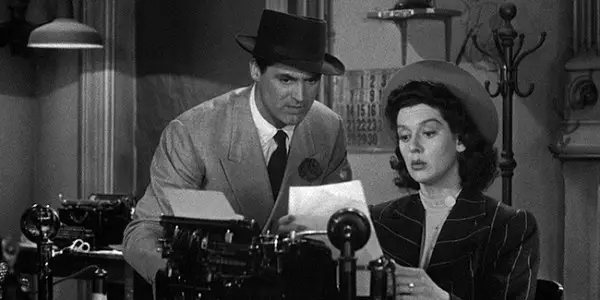
When Hildy realizes Bruce never left, and Walter was keeping this from her, she realized that he still loved her. Hildy says, “I thought you were on the level for once. That you were just standing by and letting me go off with him and not doing a thing about it.” When she realizes this isn’t the case and he was still trying to get her to stay, she admits she never stopped loving him.
Screwball comedies tie up their romances quickly with absurdity and often involve some form of trickery or mistaken identity. The ending of His Girl Friday ties into Kim’s final moments in Better Call Saul. Hildy and Kim both keep their emotions bottled up until they pour out with no chance of stopping.
For Hildy, she finally cries when she believes her ex-husband has finally given up hope for their reconciliation and no longer loves her. Hildy thinks Walter wants her to leave–to be with Bruce, but in true screwball fashion, almost the opposite is true. He had Bruce arrested by giving him counterfeit money.
For Kim, her breakdown comes after speaking with Jimmy on the phone–where she tells Jimmy to turn himself in and he angrily suggests the same to her. Before hanging up, she tells Jimmy “I’m glad you’re alive” but there is a sadness under her words. Is she wondering if Jimmy stopped loving her, like Hildy did when Walter suggested she move on from him?
His Girl Friday explores multifaceted characters and their even more intricate relationships, much like the brilliantly complex and bittersweetly romance dynamic between Jimmy McGill and Kim Wexler.
Kim Wexler, Jimmy McGill, and The Lady Eve
Preston Sturges’ The Lady Eve (1941) is a prime example of the con artist subgenre of screwball comedy and important when analyzing the screwball influence in Better Call Saul.
The Lady Eve follows Charles Pike (Henry Fonda), but he is still stuck with his childhood nickname: Hopsie, as he boards a ship and everyone tries to get close to him and impress him. Charles Pike is the heir to the Pike Ale fortune and all the women try to impress him by drinking his beer, but he personally hates beer.
Charles meets Jean Harrington (Barbara Stanwyck), a con artist who has chosen Charles as her mark, and he instantly falls in love with her.
The growing romance between Charles and Jean develops through intimate–yet not inherently sexual moments. Jean’s approach to attracting Charles involves realizing he is a buttoned-up and awkward man, unlike the droves of other women trying to blatantly get his attention.
When we look at the relationship between Kim and Jimmy in Better Call Saul–especially during their mailroom era–we see the distance between them. During a moment where Kim talks to Chuck about a case he just won, Jimmy looks on and sees how Kim will be a lawyer soon and he’ll be in the mailroom.
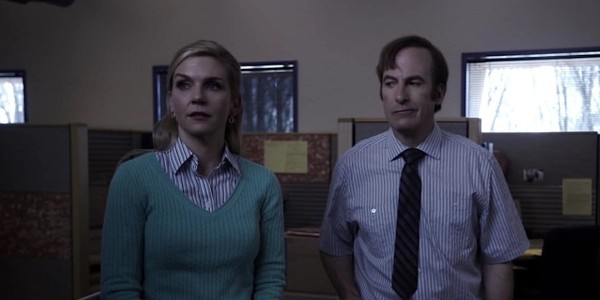
This same scene shows Howard praising Chuck with the phrase, “Hail the conquering hero.” Hail the Conquering Hero is also the name of another Preston Sturges screwball comedy about a man who gets discharged from the Marine Corps after only one month. Because his father was a Marine and a war hero, he pretends to still be fighting overseas, so he won’t disappoint his mother. This moment in Better Call Saul could be using the plot of a screwball to hint toward the animosity between Chuck and Jimmy and how he will eventually be a lawyer like his brother, without receiving the same praise.
The way Jimmy’s face falls when he’s imagining a future where Kim doesn’t need to be in the mailroom–doesn’t need to be around him anymore, highlights the differences. He wonders what brought him here, while she completely fits into her surroundings.
This difference is also shown between Jean: the con artist trying to make herself fit in & Charles: the buttoned-up professional, but just like Jimmy and Kim, neither one completely fits into their world. Kim, like Jean in The Lady Eve, is trying to mold herself to fit in a world away from the shoplifters who raised her.
Throughout their time in the mailroom, Jimmy and Kim develop a close bond, understanding how neither one is a perfect fit into their own private boxes.
We see Charles falling deeper in love with Jean as he helps take off her shoes and she runs her hands playfully through his hair. These intimate, yet simple actions help Charles feel safe in the relationship and accept it when she chooses to use his nickname Hopsie, even though he doesn’t want anyone else to use it.
In Better Call Saul, we see Jimmy and Kim in a multitude of intimate, yet not overtly sexual moments, which wonderfully highlight their romance and how it reflects the Classic Hollywood films they love to watch together. Jimmy and Kim are shown enjoying sitting on the couch together and eating pie on top of their shared bed.
And Kim’s iconic ponytail hairstyle holds profound meaning. When she’s in the mailroom with Jimmy, her hair is half up and half down. Her personality is split between the professional and moral person she yearns to be and who she really is–especially around Jimmy. When she leaves the mailroom, her hair is always in that tight, put-together ponytail, yet when she’s alone with Jimmy, her hair is completely down.
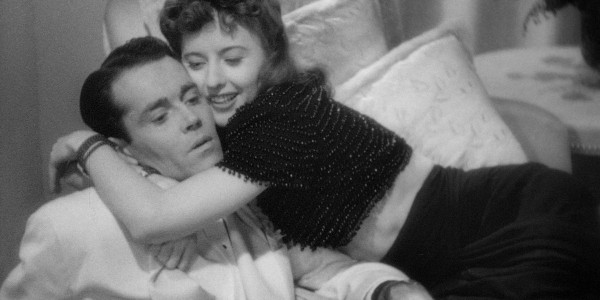
This focus on hair and how it can signify comfort recalls the intimate scene in The Lady Eve where Jean runs her hands through Charles’ hair, showing how quickly he has become completely comfortable in her presence.
An extremely powerful line in The Lady Eve comes from Jean when she tries to convince Charles they can be together even though she is a con artist. Jean says, “You don’t know very much about girls. The best ones aren’t as good as you probably think they are, and the bad ones aren’t as bad. Not nearly as bad.”
Kim Wexler and Jimmy McGill perfectly represent what Jean is suggesting with this speech. Jean views herself as bad, but made better by being with Charles. This reflects how Jimmy feels towards Kim. And in this moment, Charles reflects Kim. He leaves Jean knowing she is a con artist, even though he still loves her.
When Jean and Charles separate, she makes the decision to fall fully into her con artist identity. Much like Jimmy decides to completely become Saul Goodman.
Jean takes on a new identity and falls all the way into her scamming. She is so close to going straight and leaving this all behind, but instead she goes further into the act–behind the mask her cons allow her.
Jimmy loses himself behind the mask of Saul Goodman, but there comes a point when both Jean and Jimmy’s masks begin to crack, showing their true personalities underneath.
In The Lady Eve, Jean lights up when she realizes there is a chance she could see Hopsie again. She tries to hide the pure excitement–and make it seem like she wants revenge–but you can tell that she just wants to see him again.
The moment in Better Call Saul when Jimmy–living as Gene Takovic–hears from his old receptionist Francesca also shows his mask crumbling away. Francesca tells Jimmy that Kim called and asked about him. Jimmy exhales–his love for Kim bubbling out–as he asks, “She asked about me?” This is the moment where we know he wants this mask to be gone for good.
Jimmy and Jean both take actions to make sure they are once again in a room with the people who still hold their hearts. And they both do it in a way which highlights they will never fully leave their scamming pasts behind.
Jean pretends to be an English woman named Eve and under the guise of getting revenge on Charles, gets married to him. But maybe she just wanted to be married.
On their honeymoon, Jean makes a decision that she can’t keep lying to Charles, so she tricks him into leaving her. Her con artist family want her to use this to exact ultimate revenge on Charles, but she makes it clear that she is not after money. Her only wish is to see him again. And they reunite, not as Eve and Charles but as Jean and Hopsie. Their masks are gone and only love remains.
Like Jean, Jimmy also uses his scammer past to make sure Kim is present when he admits to all of his crimes. And this honestly brings them back together. They share one last bittersweetly romantic moment together.
Saul or Gene or Slippin’ Jimmy is now James M. McGill and he will never put on the mask again. Finally reunited, Kim and James share a cigarette once again, inside the walls of prison. Even though James was given 86 years in prison, there is still a glimpse of color in his life–the lit flame of love between him and Kim.
Conclusion
Better Call Saul has always been deeply about the complex love story between Jimmy and Kim, right up until the final moment of the series. And throughout the seasons, Jimmy and Kim’s romance has explored the passion and love found in Classic screwball comedies like His Girl Friday, The Lady Eve The Palm Beach Story, and The Philadelphia Story.
Does content like this matter to you?
Become a Member and support film journalism. Unlock access to all of Film Inquiry`s great articles. Join a community of like-minded readers who are passionate about cinema - get access to our private members Network, give back to independent filmmakers, and more.
Amanda Mazzillo is a writer with an MFA in Dramatic Writing from SCAD and a BA in Writing & Linguistics and Film Studies minor from Georgia Southern University. She enjoys writing comedy and exploring all forms of media. Her Twitter name is a bad pun: @mazzillofirefox













